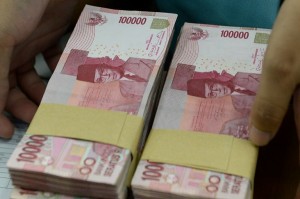Indonesia central bank hikes rates, cuts growth outlook

JAKARTA—Indonesia’s central bank Thursday unexpectedly hiked its main interest rate in an aggressive bid to boost the rupiah, as it forecast recent economic turmoil would push growth in 2013 to a four-year low.
It was the second hike in the space of two weeks, and means Bank Indonesia has now lifted its key rate 150 basis points since June to prop up the currency as investors flee Southeast Asia’s top economy.
Emerging markets, from Brazil to Turkey, have been hit hard by fears that the US Federal Reserve may taper off its bond-buying programme.
The easy-money policy fueled an investment spree in developing countries as investors looked for better returns, but the capital flows have now started to dry up as the US economy shows signs of strengthening.
Indonesia’s woes have been compounded by domestic problems, such as widening current account and trade deficits, slowing growth and rocketing inflation.
On Thursday Bank Indonesia surprised economists, who had expected the bank to stand pat, by increasing its benchmark rate 25 basis points to 7.25 percent.
Jakarta’s benchmark stock index reacted positively, ending in positive territory, up 0.17 percent, after the hike.
And some analysts welcomed the move as a positive signal Indonesian policymakers were aware of the serious dangers facing the economy and were prepared to act.
“It’s positive because it clarifies where Bank Indonesia is standing at the moment, which is stability first, then growth,” David Sumual, an economist from Bank Central Asia, told AFP.
However, others warned it was further evidence that the Indonesian economy was deteriorating faster than its emerging-market peers.
“In the last few days… the rupiah has continued to weaken, even though most other emerging market currencies have rebounded,” Gareth Leather of Capital Economics said in a note.
Bank Indonesia also revised downwards its annual economic growth forecast for 2013 to between 5.5 and 5.9 percent, from 5.8 to 6.2 percent on Thursday.
If its forecast proves to be accurate, it would be the slowest growth for the Indonesian economy since 2009.
“Bank Indonesia surveys on retail sales and consumer confidence indicate that domestic consumption may slow in the second half of 2013,” said central bank spokesman Difi Johansyah, explaining the new forecast.
Domestic consumption by a fast-emerging middle class has been one of the key drivers of Indonesia’s prolonged economic boom.
The latest hike came after the central bank lifted rates half a percentage point on August 29 at an unscheduled meeting as the stock market plummeted and the rupiah sank.
On Thursday the bank also hiked the rate it pays lenders for overnight deposits by 25 basis points to 5.50 percent.
Officials hope the move will encourage lenders to leave their rupiah with the central bank, thereby reducing money supply and in theory stopping the rupiah from weakening further.
The rupiah was trading at 11,309 to the dollar on Thursday. It has fallen around 16 percent against the dollar this year.
As well as helping the rupiah, the bank is also hoping to tackle inflation, which hit a four-year high after a hike in fuel prices.
The central bank has predicted inflation will come in at between 9.0 and 9.8 percent for the whole of 2013.—Olivia Rondonuwu